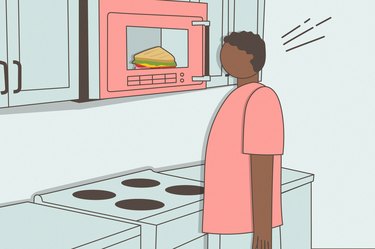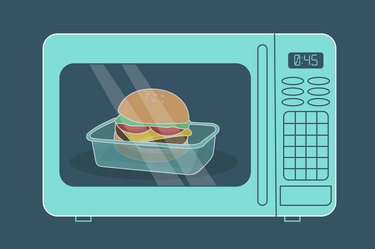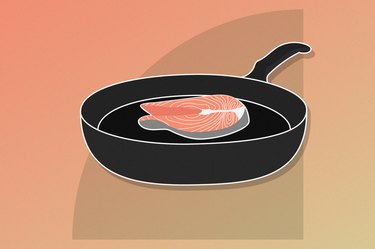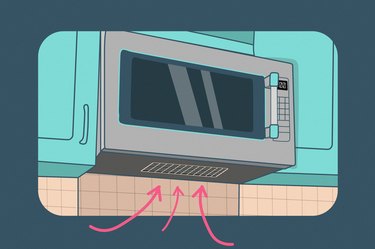
Since microwave ovens became ubiquitous in American kitchens in the 1970s, concerns about their health effects have been bandied about. Standing too close to a microwave has been purported to give you cancer, kill brain cells and harm your fertility.
So, is there any truth to the hype — or is it half-baked? Here's what you need to know.
Video of the Day
Video of the Day
First, How Do Microwaves Work?
The technology behind this handy kitchen appliance is pretty nifty. "Microwave ovens are an example of how radiation can be used for human benefit," says Percy Lee, MD, radiation oncologist for City of Hope. "The oven produces waves of electromagnetic radiation [microwaves] that vibrate water molecules to cook the food."
According to the Food and Drug Administration (FDA), a device called a magnetron emits microwaves, which reflect off the inside of the machine. The friction caused by these vibrating molecules creates the heat necessary to warm up leftovers, pop popcorn or melt butter. "The food itself does not become radioactive," Dr. Lee says.
Fun fact: Because the heat results from the movement of H2O molecules, foods with a high water content, like vegetables, cook more quickly in a microwave than dry food.
Is It Safe to Stand in Front of a Microwave?
Generally speaking, yes. "Properly functioning microwave ovens do not pose a cancer risk," Dr. Lee says. "The amount of radiation a microwave oven emits is tightly regulated by the FDA to ensure the oven is safe for household use."
The FDA restricts the amount of radiation leakage from microwaves to a miniscule amount, well below the level that can be dangerous. It also requires that ovens have two systems in place to stop microwave emission the moment the door is opened. FDA laboratories oversee microwave testing and quality control.
"Still, it's best to keep a safe distance from a microwave while it is on in case the oven is damaged or malfunctioning," Dr. Lee says. "If, for example, the seal, shielding or door of the oven are damaged, radiation could leak out."
But even if some radiation does seep out, it's no cause for panic. "Microwaves produce non-ionizing radiation, which does not have enough energy to damage cells directly," Dr. Lee says. "This makes it unlikely that brief accidental exposure would meaningfully increase cancer risk." Visible light, radio waves and wi-fi are also examples of low-energy, non-ionizing radiation.
High-energy radiation (like X-rays and CT scans), on the other hand, can be harmful to cells — which is why it's an effective cancer treatment. "In radiation therapy, this type of energy is harnessed and delivered to cancer cells in highly precise doses — it can penetrate deeper into the body to reach the cancer," Dr. Lee says. "In contrast, the radiation used by microwave ovens is less powerful than X-rays and stays inside the oven."
Per the FDA, the biggest health hazard posed by microwaves is the risk of burns from boiling liquid, hot containers and sizzling food.
And although it's extremely rare, injuries from high amounts of microwave radiation are possible, including painful burns and cataracts (when the lens of your eye becomes cloudy, causing blurry vision). So don't press your body or face up against the unit.
"Microwave radiation can heat body tissue, like skin, the same way it heats food," says Gaurav Marwaha, MD, associate professor in the Department of Radiation Oncology at RUSH University Medical Center. "Thus, the FDA recommends not standing directly against an oven for extended periods of time while it is on."
Should you take extra precautions with microwaves if you have pacemaker, a bun in the oven or a young child? "A properly sealed microwave oven does not pose a cancer risk to a person who is pregnant, a baby or a person with a heart device," Dr. Lee says.
According to the FDA, pacemakers are equipped with an electromagnetic shield to protect them from electronic interference. And if you have kiddos, take note: A February 2021 Pediatrics study found that a significant number of burns among children were caused by them opening the door and spilling the hot contents. (As of 2023, microwaves are required to have child-resistant doors.)
A final word of caution for those who work in an industrialized setting with microwave-producing machines: "The same type of non-ionizing radiation used safely in a residential microwave may be present at potentially harmful or carcinogenic levels in certain industrial settings," Dr. Lee says. "Be sure to follow workplace safety guidelines if you work around equipment that emits radiation."
How Many Feet Away Should You Stand From the Microwave?
Because a faulty or broken microwave oven is potentially harmful to use, it can't hurt to take a couple of steps back just to be on the safe side. "Microwave energy decreases the further it gets from the oven itself," Dr. Lee says, "so standing a few feet away from the device will decrease the risk of encountering any microwave radiation at dangerous levels."
As the FDA points out, "A measurement [of microwave radiation] made 20 inches from an oven would be approximately 1/100th of the value measured at two inches from the oven."
When to Stop Using Your Microwave
According to Dr. Lee, you shouldn't use a microwave if:
- It's making banging noises or other unusual sounds
- The door latch is damaged
- You see cracks in the glass or gaps in the seals
- It still functions when the door is open
If any of the above are true, stop using the microwave and either repair it or replace it with a unit in good working condition.
4 Alternatives to Microwaves
Just to be clear: There are no health-related reasons to swear off microwaves. "The idea that using them can lead to cancer is a misconception — microwaves use the same type of low-energy radiation found in radio signals," Dr. Lee says.
For those who prefer cooking equipment that does not utilize radio waves, Dr. Lee says the following appliances are excellent choices:
- Gas ovens
- Toaster ovens
- Air fryers
- Stoves
But keep in mind that cooking on gas stoves may come with its own risks.
So, How Bad Is It Really to Stand in Front of the Microwave?
Don't sweat it.
"There is virtually no chance of developing cancer from standing in front of a properly functioning microwave oven manufactured in accordance with FDA guidelines and with its safety features intact," Dr. Lee says. "Keeping several feet away from the oven while it is operating will minimize possible exposure to leaks."
Is this an emergency? If you are experiencing serious medical symptoms, please see the National Library of Medicine’s list of signs you need emergency medical attention or call 911.



